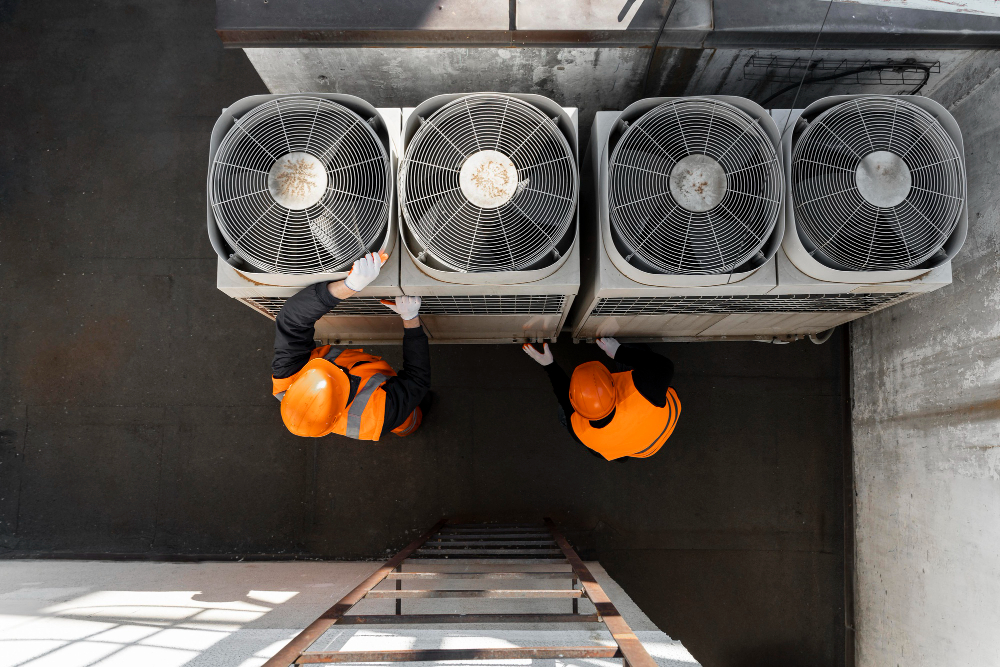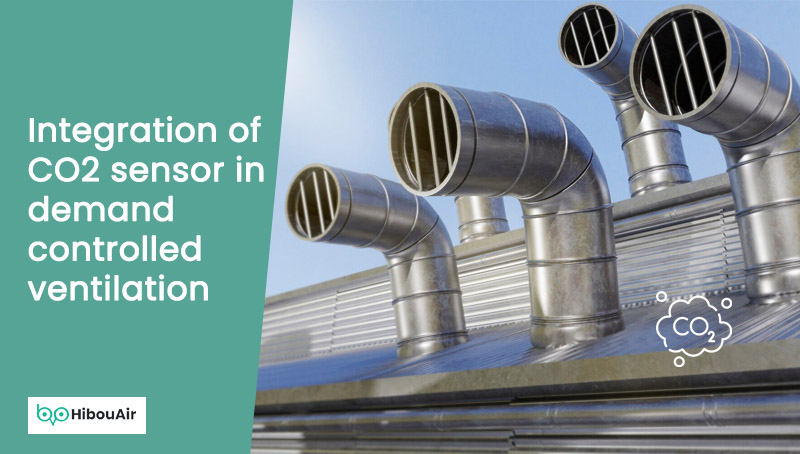The Advantages of CO2-Controlled Ventilation
In today’s world, maintaining a healthy indoor environment is more important than ever. Indoor air quality (IAQ) plays a crucial role in our well-being, affecting everything from our cognitive function to our overall health. One of the most effective ways to ensure optimal IAQ is through CO2-controlled ventilation systems. By integrating advanced technology like HibouAir, a multi-sensor air quality monitor, into your ventilation system, you can automate air quality management, ensuring a healthier, more productive, and energy-efficient indoor environment.
What is a CO2 Sensor?
A CO2 sensor is a device that measures the concentration of carbon dioxide in the air. Carbon dioxide (CO2) is a colorless, odorless gas that is naturally present in the atmosphere at low levels. However, in enclosed spaces such as homes, offices, or educational institutions, CO2 levels can quickly rise due to human activities like breathing, cooking, or burning fuels. Elevated CO2 levels can lead to discomfort, decreased cognitive performance, and even health issues if not properly managed.
CO2 sensors work by measuring the amount of infrared light absorbed by CO2 molecules in the air. The more CO2 present, the more infrared light is absorbed. This data is then processed to provide a real-time reading of the CO2 concentration, typically measured in parts per million (ppm).
How Does a CO2 Sensor Work in a Ventilation System?
In a ventilation system, CO2 sensors are used to monitor the levels of carbon dioxide in the indoor environment. When the CO2 concentration exceeds a predefined threshold, the sensor triggers the ventilation system to increase the airflow, bringing in fresh air from outside and expelling the stale, CO2-laden air. Once the CO2 levels return to an acceptable range, the system reduces the airflow, maintaining optimal indoor air quality while conserving energy.
This process, known as demand-controlled ventilation (DCV), ensures that ventilation is provided only when necessary, based on real-time air quality data. This is where HibouAir can make a significant impact.
The Advantages of CO2-Controlled Ventilation
CO2-controlled ventilation offers numerous benefits, making it an ideal solution for maintaining indoor air quality in various settings:
- Automatic Ventilation When Needed: CO2-controlled systems automatically adjust the airflow based on real-time CO2 levels, ensuring that fresh air is provided only when required. This helps maintain a healthy indoor environment without the need for manual intervention.
- Energy Savings: By ventilating only when necessary, CO2-controlled systems reduce energy consumption. Traditional ventilation systems often run continuously, wasting energy. CO2-controlled systems, on the other hand, operate only when needed, resulting in significant energy savings and lower utility bills.
- Improved Air Quality: Maintaining optimal CO2 levels is crucial for good indoor air quality. High CO2 levels can cause discomfort, headaches, and reduced cognitive performance. CO2-controlled ventilation systems ensure that indoor air quality remains within safe limits, promoting better health and productivity.
- Quick Installation and Easy Maintenance: CO2 sensors like those in HibouAir are compact, easy to install, and require minimal maintenance. Once integrated into your ventilation system, they work continuously and reliably to monitor and control air quality.
- Flexible Operation: CO2-controlled systems are highly adaptable and can be used in a wide range of indoor environments, from homes and offices to schools and healthcare facilities. The flexibility of these systems allows them to meet the specific air quality needs of different spaces.

The Importance of Good Ventilation for Health and Productivity
Ventilation is the process of replacing or exchanging air within a space to improve indoor air quality. Proper ventilation removes stale air, pollutants, and excess moisture while introducing fresh, clean air from outside. This exchange is essential for maintaining a healthy environment, but it also plays a critical role in enhancing productivity.
Research by Joseph G. Allen and John D. Macomber, presented in their book Healthy Buildings: How Indoor Spaces Drive Performance and Productivity (Harvard University Press), underscores the profound impact that indoor environments have on human health and performance. The authors highlight how well-ventilated spaces can significantly boost cognitive function, reduce the spread of illnesses, and enhance overall well-being, all of which are directly linked to productivity.
Integration of HibouAir in Demand-Controlled Ventilation Solutions
HibouAir takes CO2-controlled ventilation to the next level by offering a comprehensive, real-time air quality monitoring solution. Equipped with multiple sensors, HibouAir continuously monitors not only CO2 levels but also particulate matter (PM 1.0, PM 2.5, PM 10), ambient pressure, temperature, humidity, light, noise, and volatile organic compounds (VOCs). This multi-sensor approach provides a more complete picture of indoor air quality, enabling more effective ventilation control.
HibouAir is a BLE (Bluetooth Low Energy) device, making it easy to integrate into existing ventilation systems. By incorporating HibouAir into your demand-controlled ventilation setup, you can automate the entire process, ensuring optimal air quality with minimal effort. The real-time data provided by HibouAir can be accessed via smartphones, tablets, or other devices, allowing you to monitor and control your indoor environment from anywhere.
In addition, HibouAir’s ability to monitor multiple environmental parameters means that your ventilation system can respond not only to CO2 levels but also to other factors that affect indoor air quality, such as particulate matter or humidity. This makes HibouAir a versatile and powerful tool for maintaining a healthy and comfortable indoor environment.
CO2-controlled ventilation is a smart, efficient, and effective way to ensure good indoor air quality while also boosting productivity and minimizing energy consumption. With the integration of HibouAir, you can take full advantage of this technology, automating your ventilation system to respond to real-time air quality data. Whether in a home, office, educational institute, or healthcare facility, HibouAir provides the comprehensive monitoring and control needed to maintain a healthy, productive indoor environment, making it an essential addition to any demand-controlled ventilation system.

